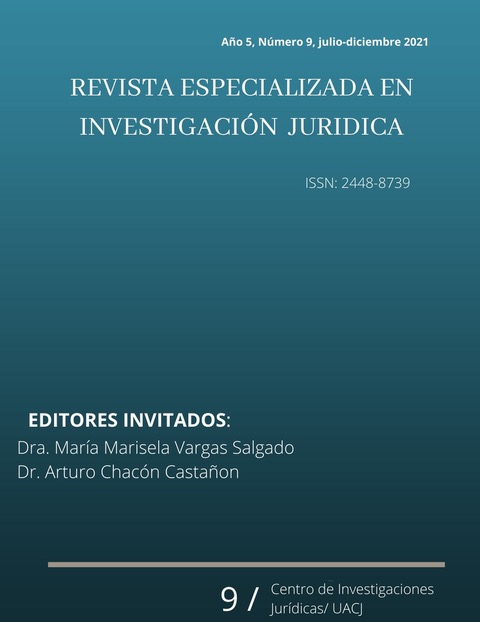Objective Imputation in the Ecuadorian Comprehensive Organic Criminal Code
DOI:
https://doi.org/10.20983/reij.2021.2.5Keywords:
criminal law, theory, behavior, schools, resultAbstract
In this scientific article, focused on the analysis of the theory of objective imputation applied in the Comprehensive Organic Criminal Code, it is a topic that has been discussed regarding the moment of attribution of a typical result to a subject’s account. The objective of the research is to analyze the various theories that arise from the objective imputation in order to demonstrate the importance of criminal dogmatics, since there is ignorance in this field, since this theory goes beyond the practice or the literality of the regulations. The Comprehensive Organic Criminal Code has taken as a background the study of the schools of criminal law, taking into account that it is the functionalist school that is in force. The dogmatic proposals of Gunter Jacobs and Claus Roxin, great professors of criminal law, have been analyzed.Downloads
References
Bodero, E. (4 de junio de 2013). La defensa penal científica. Ensayos Penales, 74.
Cancio Meliá, M. (2001). Líneas básicas de la teoría de la imputación objetiva. Argentina: Ediciones Jurídicas Cuyo.
Código Orgánico Integral Penal. (3 de febrero de 2014). Registro Oficial Suplemento 180. Quito, Ecuador: Asamblea Nacional. Obtenido de https://www.defensa.gob.ec/wp-content/uploads/downloads/2018/03/COIP_feb2018.pdf
Cornejo Aguiar, J. (9 de noviembre de 2015). Derecho Ecuador. Recuperado el 2 de febrero de 2020, de Derechoecuador.com: https://www.derechoecuador.com/teoria-causalista-y-finalista-del-derecho-penal-#_ftn1
Derecho Venezolano. (s.f.) Derechovenezolano. com. Recuperado el 21 de enero de 2020, de https://derechovenezolano.wordpress.com/2017/06/26/el-funcionalismo-moderado-de-roxin/
Garrido Montt, M. (2003). Derecho penal. Parte general, (Vol. II). Santiago de Chile: Editorial Jurídica de Chile.
Guillén, C. (2012). Debido proceso penal. Revista Jurídica, Universidad Católica de Santiago de Guayaquil, Guayaquil.
Jakobs, Günther. (1997). Derecho penal. Parte general. Marcial Pons.
Jakobs, Günther. (1998). La imputación objetiva en el derecho penal. Lima: Grijley.
Izalitur, A. (2014). Mediación del conflicto penal. Santiago: Editorian Nacional.
Ley Orgánica Reformatoria al Código Orgánico Integral Penal. (2019). Ley Orgánica Reformatoria al Código Orgánico Integral Penal.
Maraver, M. (s.f.) El principio de confianza en derecho penal, un estudio sobre la aplicación del principio de autorresponsabilidad en la teoría de la imputación objetiva. Madrid, España: Universidad Autónoma de Madrid.
Orellana Faz, K. (19 de enero de 2020). Repositorio ULVR. Recuperado el 2 de febrero de 2020, de Error de tipo y error de prohibición vencible e invencible bajo la perspectiva del garantismo penal: http://repositorio.ulvr.edu.ec/handle/44000/3646
Schúneman, B. (1997). Consideraciones sobre la imputación objetiva. Congreso Internacional de Derecho Penal, (págs. 29-229).
Zaffaroni, E., Alagia, A. y Slokar Alejandro. (2005). Manual de derecho penal. Parte general. Buenos Aires: Ediar.
Zambrano Pasquel, A. (2000). La imputación objetiva. Quito. Obtenido de http://www.alfonsozambrano.com/doctrina_penal/28102012/dpimputacion_objetiva.pdf
Zambrano Pasquel, A. (s.f.) Derecho Ecuador. Recuperado el 19 de enero de 2020, de https://www.derechoecuador.com/Files/images/Documentos/dpimputacion_objetiva.pdf
Downloads
Published
Issue
Section
License
El titular de los derechos de explotación de los contenidos de la Revista Especializada en Investigación Jurídica es el Autor o Autora
El licenciamiento bajo el cual se publican los contenidos es Atribución-NoComercial-CompartirIgual 4.0 Internacional (CC BY-NC-SA 4.0) por lo que se autoriza compartir, copiar y redistribuir el material en cualquier medio y formato, adaptar, remezclar, transformar y construir a partir del material para cualquier propósito, siempre y cuando no sea con fines comerciales y se cite al autor(es) original y a la fuente, proporcione la liga a la licencia Creative Commons e indique claramente si se hicieron cambios a la obra y especifique cuales fueron dichos cambios. Para más información consultar el apartado de Política de Acceso Abierto de la revista.

















